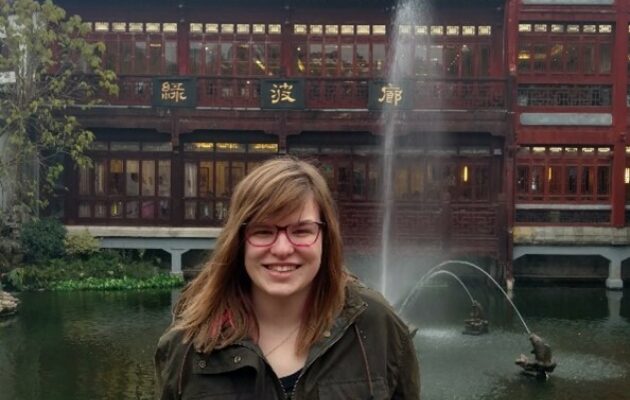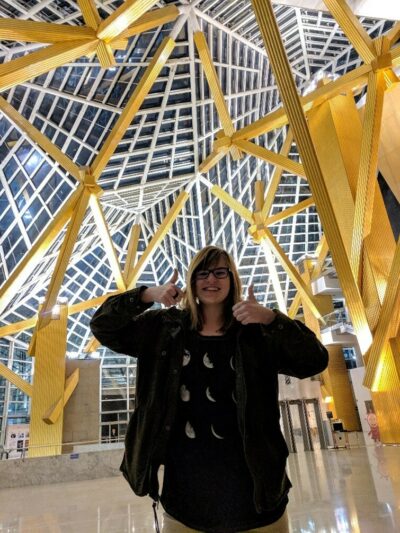
We’re asking students, recent grads, teachers, and counselors five questions on how languages play a role in shaping personal and professional success…
Meet Caitie—a University of Wisconsin-Eau Claire alumna who majored in Physics, minored in Interdisciplinary Linguistics & Mathematics, and earned a certificate in Mandarin Chinese.
1. Could you share with us a little about your earliest experiences with language in school? What drew you to learning and continuing with Mandarin Chinese?
My first exposure to languages in school was during middle school. In seventh grade, I wasn’t really sure what language I wanted to take to fulfill my graduation requirements in high school, so I took a language exploration class that covered all the languages we offered in our district: Spanish, French, German, Mandarin, and ASL. We spent a few weeks during the trimester covering the basics of each of the languages and their cultures through songs, movies, food, or other customs.
When it came time to cover Mandarin, I thought the language was beautiful to listen to, and even prettier to write. I loved the customs we covered in class, and just generally fell in love with what I was seeing.
Somewhat embarrassingly, what ultimately made me decide to study the language was none of what I just said. The song my teacher chose to acquaint us with the language was “Beijing Welcomes You,” the song China put out for the Beijing Olympics in 2008. The song got stuck in my head for months, was still there when it came time to register for classes, and here I am almost a decade later still learning Mandarin.
2. What are some ways that you have explored Mandarin outside of the classroom—any tips for fellow learners? What roles to media, music, film, or TV play in your language journey?
My first Chinese teacher encouraged us to consume as much Chinese language media as we could get our hands on. She would always tell us that music is the best way to learn how a language sounds, and movies and TV are the best way to know how people actually use the language (if you can’t go over to China every day to practice, of course). So, I started off small with listening to Chinese music as I did my homework.
When I became more comfortable with my music, and more confident in my vocabulary, I graduated myself into watching Chinese TV geared towards my age group. I would watch a show through once to get the plot and to just enjoy the show, and then again alternating the subtitles between English and Mandarin to try to work out certain phrases that were used frequently in the show but weren’t taught in my textbook.
During my freshman year of college, I was placed with a roommate originally from Beijing, China, and she introduced me to the big wide world of Chinese movies! Every few weeks we would put on a movie from China, make popcorn, and do face masks. Best. Language. Learning. Time. Ever.
3. We’d love to hear more about your experience having an international student roommate at university! Would you say that it helped to shape your growth with languages/cultures?

It was so fun having her as a roommate! Like I mentioned, she originally came form Beijing, China, to study at Eau Claire through an agreement between our two universities. It wasn’t intentional on either of our parts to room together, as we had both selected the random roommate option, and I never thought going into this that I would be paired with a native Mandarin speaker. Sometimes things just fall together nicely!
We mostly spoke English since my Mandarin wasn’t great back then, but she would help me practice whenever I needed, and helped correct my mistakes in my homework or speaking. As some may know, Mandarin is a tonal language, so I really needed to know when I was saying “hairy chest” instead of “panda.” Better to learn from her than with a stranger I’ve just met!
She also exposed me to more of the culture and language than I would have gotten solely from my classroom experience, by letting me celebrate holidays with her and chat with her family about their lives back home.
4. You’ve shared that your Mandarin courses at the University of Wisconsin Eau-Claire have prioritized the connection to Chinese culture and native speakers as well as traditional coursework. What have been your favorite (or especially memorable) lessons or moments?
Yes! My teacher, Kong Laoshi, really made it a priority to have her students be not only competent in the language, but competent in the culture as well. Eau Claire has a very large Chinese student population, and Kong Laoshi worked with many of them to come into our classes a few times a semester to teach us about their culture and lives back home, as well as to let us practice our newly acquired language skills on real, actual speakers, rather than listening to textbook recordings.
Connecting with Chinese speakers really helped us to build our colloquial language repertoire and our confidence in the vocabulary as well.
My favorite activity came at the beginning of the second semester of each year, when she would reserve part of the campus kitchen to teach us how to make dumplings. We would roll the dough, make the fillings from scratch, learn the vocabulary of each component of the dumpling, do language and culture trivia, and best of all sit down to eat the fruits of our hard work. I miss dumpling days now that I’ve graduated. Those were hands down the best class days among all my classes, not just my Chinese ones. Highly recommend trying in your own classrooms!
5. You completed a research trip abroad to China as part of the Blugold Fellows Program—wow! Could you share with us briefly the purpose and outcomes of this research? Have you got a favorite anecdote or memory involving Mandarin or Chinese culture from this experience?
Our research project’s goal was to identify and categorize the core sociocultural factors that go into the decisions made by students and parents regarding post-secondary education. We did this through surveys and interviews with students, faculty, and parents across China, and cross-referenced it with a thorough literature review conducted before we left. Although this research was completed as a team of three, I was the only person left on the team after the first year, as the rest graduated.
I was able to present our findings in Eau Claire, Madison, Wisconsin, Oklahoma, Las Vegas, and loaned it out to the school to take to even more conferences.

Many of the faculty we spoke with regarding our trip’s coordination were fluent in English, but there were many instances in which we had to rely solely on our Mandarin skills (and very shaky Cantonese) to get by.
For me, I went into this trip with minimal confidence in my language skills. I did well on my exams and homework, but that wasn’t anything like how people spoke in real life. I was scared to use my Mandarin, but I found out that my knowledge was more widespread than I thought, thanks to my amazing teacher and the many years of Chinese music and TV shows that prepared me.
I came back with a confidence in myself I had never seen before. It just took a little push to get it to come out.
BONUS QUESTION
Complete this thought: “Learning another language means…”
Learning another language means learning about yourself.
What’s next for Caitie?

Like everyone else in the world, the pandemic threw all of my future plans out the window. I had wanted to take a gap year or years to teach English abroad in either South Korea or Taiwan, and take some time to improve my language skills before figuring out what to do with the rest of my life.
Recently, the rest of my life landed squarely in my lap with a graduate school acceptance in Ireland for Medical Physics. I plan to complete my program there before deciding where in the world I would like to complete my residency. I would like to learn medical Chinese, or even medical Korean regardless of where I end up permanently, as I feel having language competency can only be a good thing.
Perhaps South Korea or Taiwan is still in my future then. Only time will tell!
Check out our Connect with Chinese, Connect with Korean, and Language Programs & Funding pages to explore language scholarships, university programs, testimonials, and more! And, as always, visit @LangConnectsFdn on social media to share your story with us.
